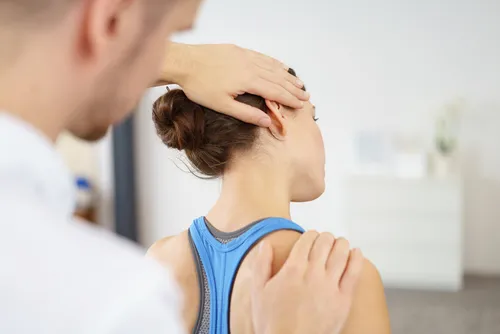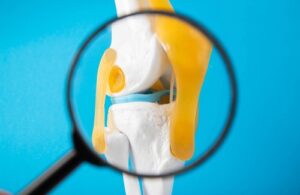Whiplash Treatment in College Park, GA
If you’ve recently experienced a car accident, sports injury, or any incident resulting in a sudden jolt to your neck, you may be dealing with a whiplash injury. Whiplash injuries can occur when your head is abruptly forced backward and then forward, often resulting in neck pain, stiffness, headaches, and more.
Georgia Spine & Orthopaedics is a trusted name for College Park whiplash injury treatment. Whether you are dealing with mild discomfort or more severe pain, we are here to help you recover. Contact Georgia Spine & Orthopaedics College Park today!
What is Whiplash?
Whiplash is a neck injury that typically occurs when your head and neck move rapidly in a back-and-forth motion, similar to the cracking of a whip. The forceful movement can strain or sprain the muscles, tendons, and ligaments in your neck, causing inflammation, pain, and reduced mobility. The most common cause of whiplash is car accidents, particularly rear-end collisions, but it can also result from contact sports, physical abuse, or any event that causes your head to snap forward and backward quickly.
While whiplash is often thought of as a temporary injury, it can lead to long-term complications if not treated appropriately. If left untreated, it can result in chronic pain, stiffness, and decreased range of motion. However, with prompt and effective treatment, the vast majority of individuals with whiplash injuries recover fully.
Common Symptoms of Whiplash
The symptoms of whiplash can vary from person to person and may not always appear immediately after the injury. In some cases, symptoms can develop hours or even days later. Here are some common signs that you may have suffered a whiplash injury:
- Neck pain and stiffness: This is the most common symptom and may range from mild to severe.
- Headaches: Tension headaches, often felt at the base of the skull, are a common side effect of whiplash.
- Dizziness or vertigo: Many individuals experience a feeling of lightheadedness or dizziness after a whiplash injury.
- Shoulder or back pain: The impact can also affect the muscles in your upper back and shoulders.
- Numbness or tingling: In some cases, you may experience tingling or numbness in your arms or hands.
- Difficulty concentrating or memory issues: These cognitive symptoms, known as “whiplash-associated disorder” (WAD), can sometimes occur.
- Jaw pain or difficulty chewing: This can happen due to the strain on the muscles of the neck and jaw.
- Fatigue: The trauma of the injury can lead to feelings of exhaustion or tiredness.
If you’re experiencing any of these symptoms, it’s important to seek professional care as soon as possible to prevent further complications.
Causes of Whiplash
Whiplash is most commonly caused by:
- Car Accidents: Rear-end collisions are the leading cause of whiplash. In these accidents, the force of impact propels the head backward and then forward, often causing severe strain on the neck muscles.
- Sports Injuries: Contact sports such as football, hockey, and rugby can result in sudden movements that lead to whiplash-like injuries. Even non-contact sports like gymnastics and wrestling can result in neck strain.
- Physical Abuse: Physical abuse, such as being grabbed by the neck or shaken, can cause a whiplash injury.
- Falls: Falling on your back or head can result in whiplash if your head is forced backward.
- Other Accidents: Any situation that causes a sudden, violent jolt to the head and neck, such as a slip and fall or an accident at work, can lead to whiplash.
How Is Whiplash Diagnosed?
If you suspect you have a whiplash injury, the first step is to see a healthcare professional for a thorough evaluation. At Georgia Spine & Orthopaedics, our specialists begin with a complete physical examination, reviewing your medical history and asking about the circumstances of the accident or injury. We may assess the range of motion in your neck and observe for any signs of swelling, bruising, or tenderness.
We may recommend imaging tests, such as X-rays, MRI scans, or CT scans, to rule out fractures or other underlying conditions that could be contributing to your symptoms. These diagnostic tools help us get a clear picture of the extent of your injury, allowing us to create the most effective treatment plan for your needs.
College Park Whiplash Injury Treatment
There are several treatment options available for those suffering from whiplash. The goal of treatment is to alleviate pain, reduce inflammation, improve range of motion, and prevent long-term complications. At Georgia Spine & Orthopaedics, we provide whiplash injury treatment plans tailored to your specific needs.
Rest and Ice Application
In the initial phase after a whiplash injury, it’s important to rest the affected area. Rest helps to reduce strain on the neck and allows the muscles to heal. Applying ice during the first 48 hours after the injury can help reduce swelling and inflammation. Ice should be applied for 15-20 minutes at a time, several times a day, to manage pain.
Physical Therapy
Once the acute pain has subsided, physical therapy is often recommended to strengthen the muscles in the neck and restore mobility. Physical therapy involves exercises that improve range of motion, flexibility, and posture. Our College Park physical therapists will guide you through specific exercises designed to relieve tension, prevent stiffness, and reduce the risk of long-term pain.
Chiropractic Care
Chiropractic care is a non-invasive treatment that can help realign the spine and improve overall spinal health. Chiropractors use manual manipulation techniques to restore proper alignment to the neck and spine, which can help relieve pain and reduce muscle tension. Chiropractic adjustments can provide significant relief for whiplash symptoms.
Medications
To manage pain and inflammation, over-the-counter medications like ibuprofen or acetaminophen may be recommended in the early stages of recovery. For more severe cases, prescription pain relievers or muscle relaxants may be used under a doctor’s supervision to manage discomfort. These medications are typically used in conjunction with other treatments and for a limited duration to avoid dependency.
Massage Therapy
Massage therapy can be a beneficial treatment for whiplash injuries by targeting the muscles and soft tissues in the neck and upper back. Deep tissue massage helps to reduce muscle spasms, increase blood flow, and promote healing. It can be particularly effective in managing chronic pain and stiffness associated with whiplash.
Injections
If pain persists despite other treatments, injections may be used to provide relief. Corticosteroid injections can help reduce inflammation and alleviate pain. These injections are often used as part of a comprehensive treatment plan when other whiplash treatment options have not been effective.
Surgery
Surgery is rarely required for whiplash injuries, as most individuals recover with conservative treatments. However, orthopedic surgery may be considered if there is significant spinal damage or if other treatments are not successful. Surgical procedures are typically reserved for severe cases and are performed only when other treatment options have been exhausted.
Why Choose Georgia Spine & Orthopaedics?
At Georgia Spine & Orthopaedics, we understand that whiplash injuries can be debilitating and frustrating. Our College Park whiplash injury treatment team is dedicated to providing the highest quality of care to help you recover as quickly and safely as possible. We work closely with each patient to develop a personalized treatment plan based on the severity of their injury and their individual needs. Our goal is to help you regain full function and alleviate pain so that you can return to your normal activities.
We offer a variety of non-surgical treatments that are effective in addressing whiplash pain, and we take a conservative approach to care, ensuring that more invasive treatments are only used when absolutely necessary. We also provide rehabilitation services to help you improve strength, flexibility, and posture, reducing the risk of future injuries.
Check out our patient reviews.
Common Questions About Whiplash Treatment
How long does recovery from a whiplash injury take?
The recovery time for a whiplash injury can vary depending on the severity of the injury, your overall health, and how well you follow your treatment plan. For most people, the acute symptoms of whiplash, such as pain and stiffness, begin to improve within a few days to a few weeks. Many individuals experience significant recovery within 4 to 6 weeks with appropriate treatment.
However, some people may continue to experience mild symptoms, such as neck stiffness or headaches, for several months. In cases of more severe whiplash or if there are complications, recovery may take longer, potentially several months. The key to a quicker recovery is starting treatment early and following a comprehensive care plan, including physical therapy and pain management.
Can whiplash cause long-term damage?
While most individuals with whiplash recover fully, in some cases, the injury can lead to long-term complications. Without timely and appropriate treatment, whiplash can result in chronic pain and a reduced range of motion.
In some people, whiplash can lead to ongoing symptoms such as chronic neck pain, headaches, dizziness, and fatigue. This condition is sometimes referred to as “whiplash-associated disorder” (WAD). Although rare, the injury can also cause long-term nerve damage, especially if there is compression or damage to the spinal cord or nerves in the neck.
The right College Park whiplash treatment plan minimizes the chances of long-term damage.
When should I start whiplash injury treatment?
It is crucial to begin treatment for a whiplash injury as soon as possible. Immediate attention can help reduce pain, prevent the development of long-term symptoms, and speed up recovery. Contact our College Park whiplash injury treatment team as soon as possible after a car accident.
Get the Best Treatment for Whiplash in College Park
If you’re suffering from whiplash in College Park, don’t wait to seek help. Early whiplash injury treatment can make all the difference in your recovery. Georgia Spine & Orthopaedics is here to guide you through every step of the healing process, helping you get back to living your life pain-free.
Contact us today to schedule a consultation.







